XX年新版人教版九年级英语上册Unit4单元导学案
人教版英语九年级上册第四单元作文导学案
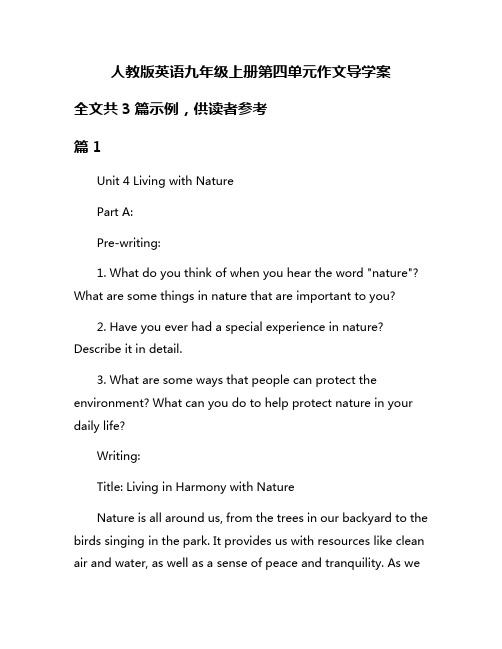
人教版英语九年级上册第四单元作文导学案全文共3篇示例,供读者参考篇1Unit 4 Living with NaturePart A:Pre-writing:1. What do you think of when you hear the word "nature"? What are some things in nature that are important to you?2. Have you ever had a special experience in nature? Describe it in detail.3. What are some ways that people can protect the environment? What can you do to help protect nature in your daily life?Writing:Title: Living in Harmony with NatureNature is all around us, from the trees in our backyard to the birds singing in the park. It provides us with resources like clean air and water, as well as a sense of peace and tranquility. As wego about our daily lives, it's important to remember that we are not separate from nature – we are a part of it. Therefore, it is crucial that we take care of our environment and live in harmony with nature.One of my most memorable experiences in nature was when I went camping in the mountains with my family. We spent a weekend hiking, fishing, and enjoying the stunning views. I remember feeling so connected to the world around me, and it made me realize how important it is to protect the natural world.There are many ways that we can protect the environment and live in harmony with nature. For example, we can reduce, reuse, and recycle our waste to minimize our impact on the planet. We can also plant trees, clean up trash, and support organizations that work to preserve natural habitats. In my daily life, I try to use less plastic, walk or bike instead of driving, and conserve water and energy whenever possible.By taking small steps to protect the environment, we can make a big difference in the world around us. Let's work together to live in harmony with nature and ensure a sustainable future for generations to come.Part B:1. What are some ways that you can protect the environment in your daily life?2. Do you think people are doing enough to protect nature? What more can be done to preserve our natural world?3. How do you feel when you spend time in nature? How does it make you appreciate the world around you?Part C:Peer Review:1. Read your partner's essay and make notes on what you liked about it.2. Offer suggestions for improvement, such as adding more specific details or expanding on certain points.3. Discuss ways that you can work together to protect the environment and live in harmony with nature.篇2Unit 4 Language points (Revision)【目标】1.熟练掌握本单元单词、词组、重点句型、语法。
九年级英语上册unit4单元课时导学案(人教版)

九年级英语上册unit4单元课时导学案(人教版)课时一: Reading本节课的学习目标是阅读理解文章,掌握关键词和短语,提高阅读效果。
一、预习导引在本节课中,我们将阅读一篇关于长城的文章。
在阅读之前,请完成以下预习任务:1.快速浏览文章,了解文章的大致内容和结构。
2.找出并学习一些关键词和短语,例如“Great Wall”(长城)、“tourists”(游客)、“history”(历史)等。
二、阅读理解请认真阅读以下文章,并回答下面的问题:The Great Wall of ChinaThe Great Wall is a famous landmark in China. It is over 21,000 kilometers long. It was built thousands of years ago. It was built to keep out invaders.The Great Wall is made of stone, brick, and earth. It is very wide in some places, and very narrow in others. Some parts of the wall are quite steep.Every year, millions of tourists from all over the world visit the Great Wall. They come to learn about the history of China and to experience the grandeur of this ancient wonder.If you ever visit China, make sure you see the Great Wall. It is truly a sight to behold!问题:1.What is the Great Wall?2.Why was the Great Wall built?3.What is the Great Wall made of?4.What do tourists do when they visit the Great Wall?5.What is the author’s suggestion to readers?三、课堂讨论请同学们回答上面的问题,并进行一次课堂讨论。
(新)人教新目标版九年级上册Unit 4 导学案(精品)

九年级〔上〕英语〔RJ〕导学案Unit4 I used to be afraid of the dark【单元学习目标】〔1〕知识与技能:掌握重点单词、短语、句型,学会运用used to句型及其相似的句型。
〔2〕过程与方法:通过多媒体教学,让学生通过独立学习、合作交流、互相帮助的学习方法来获得知识,培养学生的自主学习能力。
〔3〕情感态度与价值观:通过本单元的学习,让学生学会观察同一个事物或者人以前和现在的变化,让学生更加关注身边的美好事物。
第一课时SectionA 1a—2d【学习目标】:一、语法〔used to do sth.的用法〕ed to do sth. “过去常常做某事〞表示过去的习惯动作或状态,现在已不再发生或不存在。
e.g. I never used to eat cakes, but I eat a lot now.过去我从不吃蛋糕,但是现在我吃很多。
2. used to do sth.的否认形式:used not to do sth.或didn’t use to do sth.一般疑问句形式:Did sb. use to do sth.?或Used sb. to do sth.?3.相似短语:be/get/become used to doing sth. 习惯于做某事e.g. Mary is used to wearing a T-shirt and jeans.玛丽习惯于穿T恤衫和牛仔裤。
be used to do sth. 被用来做某事e.g. Wood can be used to make paper. 木头能被用来造纸。
【稳固练习】单项选择题〔〕1.Mary used to ___ to work, but she is used to _____ to work now.A. riding a bike; taking a busB. riding a bike; take a busC. ride a bike; taking a busD. ride a bike; take a bus〔〕2.She ______ lives alone. But she_____ living alone because she feels lonely.A. used to; doesn’t used toB. is used to; was used toC. used to; is not used toD. was used to; doesn’t used to〔〕3.—How is your grandma?--She’s fine. She used to _______TV at home after supper. But now she is used to _______ out for a walk.A. watch; goB. watching; goC. watching; goingD. watch; going〔〕4.Her son _____Coke, but now he _____milk.A. used to drink; is used to drinkingB. used to drinking; drinksC. is used to drinking; used to drinkD. is used to drinks; is drinking二、词汇目标:1.What be sb. like? 对性格提问What do/does sb. look like? 对外貌、长相提问2.humorous adj. 有幽默感的,滑稽有趣的humor n.幽默,诙谐humorist n. 有幽默感的人3.silent adj. 沉默的,不说话的silence n. 沉默,寂静keep silent 保持沉默4.helpful adj. 有用的,有帮助的be helpful to sb./sth. 对某人/某物有帮助5.on a ... team 在....队里6.from time to time 时常,有时e.g. Good ideas swim into my mind from time to time.7.This party is such a good idea! 这个聚会是如此棒的一个主意!such+a/an+adj.+n.= so+adj.+a/an+n.8.I agree 我同意= I think so表示不同意时用I don’t agree 或I disagree9.It’s been three years since we last saw our primary school classmates.自从我们上次小学同学见面以来已经有三年的时间了。
人教版九年级全一册英语unit 4单元导学案unit 4 a
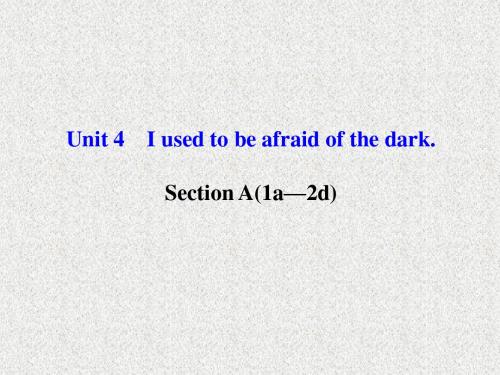
Ⅰ. 单词填写
1. humorous(adj. )
______________
2. score(n. &v. )
______________
3. silence(n. )
→__________ (adj. )沉默的
3. 他过去戴眼镜吗? __________ he__________ __________ wear glasses? 4. 比利的变化是如此的大! Billy has changed__________ __________ ! 答案: 3. Did; use to 4. so much
1. He used to be so shy and quiet. ____________________________ 2. It’s been three years since we last saw our primary school classmates. ____________________________ 答案: 1. used to意为“过去常常”, 后接动词原形, 表示过去的 动作和状态。 2. it’s是it has的缩写, 该句的前半句为现在完成时。
4. help(v. )
→__________ (adj. )有帮助的
答案: 1. 有幽默感的; 滑稽有趣的 2. 得分; 进球
3. silent 4. helpful
Ⅱ. 短语互译
1. 时常; 有时
______________
2. 戴眼镜
______________
3. 对……更感兴趣
______________
人教版最新版九年级英语导学案—Unit-4-I-used-to-be-afraid-of-the-dark
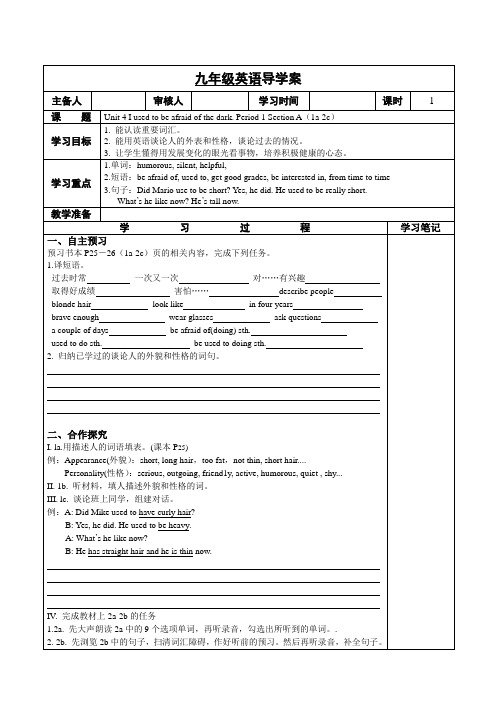
九年级英语导学案主备人审核人学习时间课时 1 课题Unit 4 I used to be afraid of the dark. Period 1 Section A(1a-2c)学习目标1. 能认读重要词汇。
2. 能用英语谈论人的外表和性格,谈论过去的情况。
3. 让学生懂得用发展变化的眼光看事物,培养积极健康的心态。
学习重点1.单词:humorous, silent, helpful,2.短语:be afraid of, used to, get good grades, be interested in, from time to time3.句子:Did Mario use to be short? Yes, he did. He used to be really short.What’s he like now? He’s tall now.教学准备学习过程学习笔记一、自主预习预习书本P25-26(1a-2c)页的相关内容,完成下列任务。
1.译短语。
过去时常一次又一次对……有兴趣取得好成绩害怕……describe peopleblonde hair look like in four yearsbrave enough wear glasses ask questionsa couple of days be afraid of(doing) sth.used to do sth. be used to doing sth.2. 归纳已学过的谈论人的外貌和性格的词句。
二、合作探究I. la.用描述人的词语填表。
(课本P25)例:Appearance(外貌):short, long hair,too fat,not thin, short hair....Personality(性格):serious, outgoing, friend1y, active, humorous, quiet , shy...II. 1b. 听材料,填人描述外貌和性格的词。
九年级英语上册UNIT4单元课时导学案(人教版)

unit 4 i used to be afraid of the dark.period 1一.学习新单词humorou /hju:mərəs/ a. 有幽默感的;滑稽的silent /sailənt/ adj. 不说话的;沉默的helpful /helpfl/adj. 有用的;有帮助的from time to time 时常;有时adj. 亚洲/人的; n. 亚洲人dare /deə/, /der/ v. 敢于;胆敢private /praivət/ adj. 私人的;私密的guard /ga:(r)d/ n. 警卫;看守v. 守卫;保卫british /britiʃ/ adj. 英国的;英国人的ant / ænt/ n. 蚂蚁seldom /seldəm/ adv. 不常;很少proud /praud/ adj. 自豪的;骄傲的be proud of 为⋯⋯骄傲;感到自豪absent / æbsənt/ adj. 缺席;不在fail /feil/ v. 失败;未能(做到)examination /igzæmineiʃn/ n. 考试;审查in person 亲身;亲自take pride in 为⋯⋯感到自豪grandson /grænsʌn/ n. 孙子;外孙general /dʒenrəl/ a. 普遍的;常规的;总的n. 将军 p.32paula /pɔ:lə/ 葆拉(女名) p.26alfred /ælfrid/ 艾尔弗雷德(男名) p.26billy /bili/ 比利(男名)p.26jerry /dʒeri/ 杰里(男名);杰丽(女名)p.28emily /emili/ 埃米莉(女名) p.28period 2一.学习used to 的用法used to的含义为“__________________”,是一个固定结构,其后跟动词原形,它表示过去的某种经常性,习惯性的行为或动作,并暗示现在已无此习惯。
人教版初三英语上册Unit4第一课时导学案

Unit 4 what’s the best movie theater?Section A 1a—2c【学习目标】1.单词及短语:comfortable,seat,screen,close,theater,学习worst 、cheaply、song、choose 、carefully 谈论clothes store和radio station2.学会并能掌握形容词、副词最高级的构成方法和用法(难点)【学习重点难点】学会并能掌握形容词、副词最高级的构成方法和用法(难点)【学法指导】1、浏览信息2、作比较3、合作学习【教学过程】学习任务一导入(启发探究)1我们曾在Unit3学过形容词比较级的构成及其用法,试着完成下面的练习①Who is (outgoing),Lily or Lucy?②Peter is (funny)than any other boy in his class.2. 归纳总结①A比B更……:A+be+形容词比较级+the+B.②A和B一样:(as……as)③A是两者中更……的一个:④越……越……学习任务二交流(合作探究)1.完成1a discuss:∙do you like to go to the movies?∙who is your favorite movie star?∙why do you like him / her?∙what kind of movies do you like best?∙where do you want to go ,cinema、radio station or theater?whyif there are many movie theaters, which movie theaters do you want to go to?what’s important or not important for a cinema? let’s see 1a. how do you choose what movie theater to go to? write the things in the box under "important" or "not important".想想译译comfortable seats big screens cheap友好的服务新电影close to homein a fun part of town popular如果你去电影院看电影,你认为上面列举的这些,哪些对你来说显得重要,哪些不重要?请试着完成1a,也可以增加一些内容。
九年级上册英语unit4全单元导学案
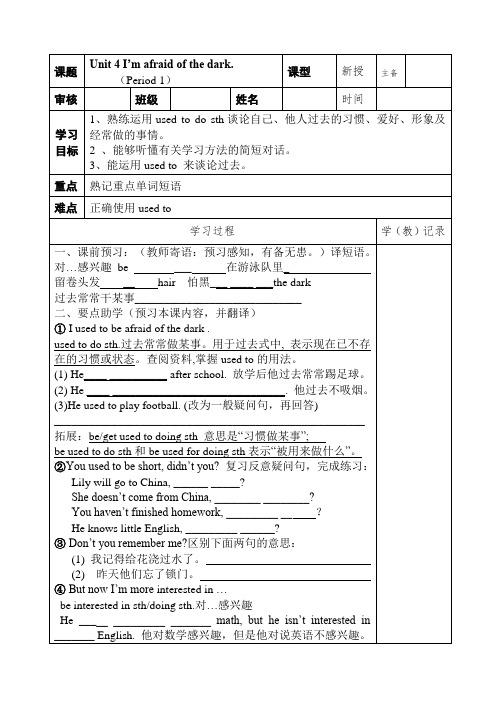
重点
熟记重点单词短语
难点
进一步掌握used to并运用
学习过程
学(教)记录
一、课前预习。(教师寄语:预习感知,有备无患)
要点助学(预习本课内容,在课本上划出下列句子,并翻译)
①alone独自一人的, lonely孤独的,寂寞的能从意思上看出两单词的区别吗?
This little boy lived in this house ______, but he didn’t feel_____.
三、课堂活动(教师寄语:展示自我,合作提高)
1检查课前预习,各小组展示讨论并探索存在的问题。2.朗读单词,完成1a
3两人一组谈论过去的外表、性格等及与现在的不同。例如:I used to be short, but now I am tall. (用quiet ,shy/outgoing, have straight hair/have curly hair等谈论P10(1a) )。
4. Where ___________ live before you came here?
A. did you used to B. did you use to C. use he to D. he used to
5.My sister used to have long hair,?
A. used she B. didn’t she C. have she? D. did she
①I used to be afraid of the dark .
used to do sth.过去常常做某事。用于过去式中,表示现在已不存在的习惯或状态。查阅资料,掌握used to的用法。
(1) He____ __________after school.放学后他过去常常踢足球。
人教版英语九年级上册第四单元作文导学案

人教版英语九年级上册第四单元作文导学案Unit 4 Healthy EatingWriting Study GuideIn this unit, we have learned about the importance of healthy eating and the benefits it brings to our overall well-being. Through various activities and discussions, we have explored different food groups, nutritional guidelines, and ways to maintain a balanced diet. Now, let's put our knowledge into practice by writing a composition on the topic of healthy eating.Below are some tips and guidelines to help you write a successful composition:1. Choose a specific aspect of healthy eating to focus on, such as the importance of balanced meals, the role of exercise in maintaining a healthy lifestyle, or the impact of fast food on our health.2. Start by introducing your topic and stating your main idea or argument. This will help guide your readers and set the tone for the rest of the composition.3. Provide evidence and examples to support your main idea. You can draw from personal experiences, scientific research, or expert opinions to make your argument more persuasive.4. Use transition words and phrases to connect your ideas and create a smooth flow of information. This will help make your composition more coherent and easier to follow.5. Conclude your composition by summarizing your main points and restating your argument. You can also offer suggestions for further research or ways to implement healthy eating habits in your daily life.Remember to proofread your composition for grammar, punctuation, and spelling errors before submitting it. Pay attention to the language you use and try to vary your vocabulary and sentence structures to make your writing more engaging.Good luck! We look forward to reading your compositions on healthy eating.。
新版人教版九年级英语上册Unit4单元导学案

2014年新版人教版九年级英语上册Unit4单元导学案刘营初中九年级英语五步案执笔龚琴审核初三英语组课型听说课课时1 授课人授课时间姓名学案编号N【课题】Unit 4 I used to be afraiddaA 1a-1c教师复备栏或学生笔记栏【学习目标】1 熟练运用used to do sth谈论自己、他人过去的习惯、爱好、形象及经常做的事情。
2 能够听懂有关学习方法的简短对话。
3能运用used to 来谈论过去。
【学习重点难点】1熟记重点单词短语。
2 正确使用used to 【学法指导】谈论自己和同学的变化----听读感受别人的变化---巩固练习【教学过程】【教学过程】一、导入(启发探究 3分钟)used to的用法“used to+动词原形”表示过去常常干某事,现在不在干了。
只有一种形式,即过去式。
例如:I used to go to work by bus. Now I take a tax“I used to be afraiddark.” mea:我过去常害怕黑暗。
“used to”的疑问形式和否定形式:—Did you use to be afraiddark?—Yes, I used to be afraidda—Did he use to be afraiddark?—No, he did not use to be afraidda_There used to be a chudidn ‘?跟踪练习(1) He______ ______ ____ al. 放学后他过去常常踢足球。
(2) He ____ ______ _____ __________________. 他过去不吸烟。
(3)He used to play football. (改为一般疑问句,再回答)_________________________________________________ ______朗读,体会used to的用法Bob: Wow, Mario, you look d! You used to bdidn’tyou?Mario: Yes, I did. Now I’m tall. And so are you!Bob: That’s true. And you used to wear glasses. Amy: Hi, Bob. How are you?Bob: Fine. Wow, you’ve changed!Amy: Really? How?Bob: You used to havaAmy: You remember that? Yes,I did.二、自学(自主探究 6分钟)朗读、翻译短语I haven’u for four years! a couple of daNow I’m tall. And so are you! you used to wear glau’ve changed! You used to havau used to be really tall! Not aused to be red, didn’t it? it used to be curly. You used to bdidn’t you? 复习反意疑问句,完成练习:(1)Lily will ga, ______ _____?(2)She doesn’a, ________ ________?(3) You haven’d homework, _________ __ ?(4) He knows little English, _________ ______?三、交流(合作探究 10分钟)注意谈论外貌和性格的不同句型What’like ?What dlook like?完成1a两人一组谈论自己过去的外表、性格等及与现在的不同。
英语人教版九年级全册unit4 导学案

3). _____work inBeijing?
A. Did you used to B. Did you use to
C. Do you used to D. Do you use to
4). Where _____ live before you came here?
自主学习调动学生学习积极主动性,培养自学能力,真正做学习的主人。教师要多鼓励,多指导,完成基础知识的回顾
复习。
学生通过小组合作辨析,互帮互助,注重培养学生
分钟的时间做题,认真完成任务。
然后学生展示成果,师生互问探讨,补标点拨。
Pairwork在小组成员合作练习后,教师要求课上展示,其他学生仔细听并纠错。教师要作合适的评价,多鼓励,少批评。鼓励学生大胆说话,勇于表现。
A. seems B. looks C. looks D. seem
四)补标点拨
对语言点的跟踪练习学生展示成果,师生互问探讨,补标点拨。
五)Pairwork.小组活动,展我风采。
A: What did you use to be like? And now?
B:I …
A: What did you use to like? And now?
6). Mary is used to _______ up early.
A getting B get C to et D got
7).Many girls are terrified of walking _______ at night.
A. lonely B. alone C. alonely
ed to, used to ed to, is used to
九年级英语上册unit4单元课时导学案(人教版)

九年级英语上册unit4单元时导学案(人教版)Unit4IusedtbeafraidfthedarPerid一.学习新单词huru/hu:ərəs/a有幽默感的;滑稽的silent/sailənt/ad不说话的;沉默的helpful/helpfl/ad有用的;有帮助的frtiettie时常;有时sre/s`:/n≈v得分;打分bagrund/bægraund/n背景intervie/Intəvu:/v采访;面试n访谈Asian/eiʃn,/ad亚洲/人的;n亚洲人dealith对付;应付dare/deə/,/der/v敢于;胆敢private/praivət/ad私人的;私密的guard/ga:d/n警卫;看守v守卫;保卫require/riaiə/v需要;要求British/britiʃ/ad英国的;英国人的speeh/spi:tʃ/n讲话;发言ant/ænt/n蚂蚁inset/inset/n昆虫influene/influəns/v≈n 影响seld/seldə/adv不常;很少prud/praud/ad自豪的;骄傲的beprudf为⋯⋯骄傲;感到自豪absent/æbsənt/ad缺席;不在fail/feil/v失败;未能(做到)exainatin/igzæineiʃn/n考试;审查barding/b`:diŋ/shl`寄宿学校inpersn亲身;亲自exatl/igzætli/adv确切地;精确地pride/praid/n自豪;骄傲taepridein为⋯⋯感到自豪grandsn/græns>n/n孙子;外孙general/dDenrəl/a普遍的;常规的;总的n将军p32intrdutin/intrəd>ʃn/n 介绍p32Paula/p`:lə/葆拉(女名)p26Alfred/ælfrid/艾尔弗雷德(男名)p26Bill/bili/比利(男名)p26and/ændi/坎迪(女名)p27err/dDeri/杰里(男名);杰丽(女名)p28Eil/eili/埃米莉(女名)p28Perid2一.学习usedt的用法usedt的含义为“__________________”,是一个固定结构,其后跟动词原形,它表示过去的某种经常性,习惯性的行为或动作,并暗示现在已无此习惯。
最新人教版九年级英语上册导学案(全册)
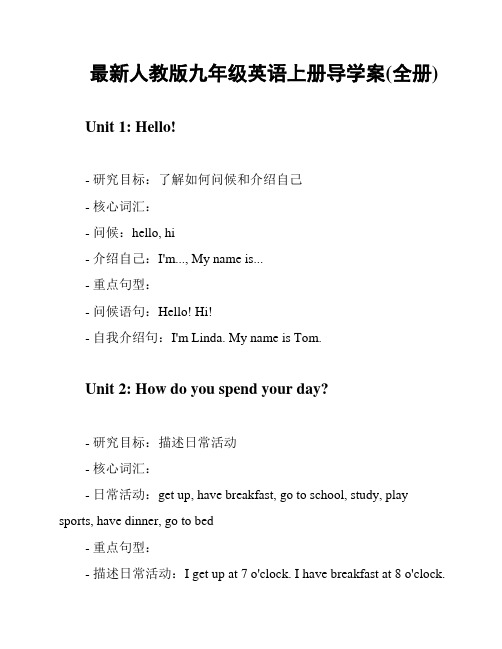
最新人教版九年级英语上册导学案(全册) Unit 1: Hello!- 研究目标:了解如何问候和介绍自己- 核心词汇:- 问候:hello, hi- 介绍自己:I'm..., My name is...- 重点句型:- 问候语句:Hello! Hi!- 自我介绍句:I'm Linda. My name is Tom.Unit 2: How do you spend your day?- 研究目标:描述日常活动- 核心词汇:- 日常活动:get up, have breakfast, go to school, study, play sports, have dinner, go to bed- 重点句型:- 描述日常活动:I get up at 7 o'clock. I have breakfast at 8 o'clock.Unit 3: How much is it?- 研究目标:研究购物和问价格- 核心词汇:- 购物:buy, shop, store- 价格:how much, expensive, cheap- 重点句型:- 问价格:How much is the T-shirt? It's 50 yuan. Unit 4: What's the weather like today?- 研究目标:谈论天气状况- 核心词汇:- 天气:weather- 天气状况:sunny, cloudy, rainy, snowy- 重点句型:- 谈论天气:What's the weather like today? It's sunny. ...(继续编写其他单元的导学案)总结:本册导学案主要包括九年级英语上册各个单元的核心词汇、学习目标和重点句型,旨在帮助学生更好地掌握课程内容。
通过学习这些导学案,学生可以增强他们的英语听说读写能力,提高英语表达的准确性,为下学期的学习打下坚实的基础。
人教pep版九年级英语 Unit 4 导学案

九年级(上)英语(RJ)导学案Unit 4 I used to be afraid of the dark【单元学习目标】(1)知识与技能:掌握重点单词、短语、句型,学会运用used to句型及其相似的句型。
(2)过程与方法:通过多媒体教学,让学生通过独立学习、合作交流、互相帮助的学习方法来获得知识,培养学生的自主学习能力。
(3)情感态度与价值观:通过本单元的学习,让学生学会观察同一个事物或者人以前和现在的变化,让学生更加关注身边的美好事物。
第一课时Section A 1a—2d【学习目标】:一、语法(used to do sth.的用法)1. used to do sth. “过去常常做某事”表示过去的习惯动作或状态,现在已不再发生或不存在。
e.g. I never used to eat cakes, but I eat a lot now.过去我从不吃蛋糕,但是现在我吃很多。
2. used to do sth.的否定形式:used not to do sth.或didn’t use to do sth.一般疑问句形式:Did sb. use to do sth.? 或Used sb. to do sth.?3. 相似短语:be/get/become used to doing sth. 习惯于做某事e.g. Mary is used to wearing a T-shirt and jeans.玛丽习惯于穿T恤衫和牛仔裤。
be used to do sth. 被用来做某事e.g. Wood can be used to make paper. 木头能被用来造纸。
【巩固练习】单项选择题()1.Mary used to ___ to work, but she is used to _____ to work now.A. riding a bike; taking a busB. riding a bike; take a busC. ride a bike; taking a busD. ride a bike; take a bus()2.She ______ lives alone. But she_____ living alone because she feels lonely.A. used to; doesn’t used toB. is used to; was used toC. used to; is not used toD. was used to; doesn’t used to()3.—How is your grandma?--She’s fine. She used to _______TV at home after supper. But now she is used to _______ out for a walk.A. watch; goB. watching; goC. watching; goingD. watch; going()4.Her son _____Coke, but now he _____milk.A. used to drink; is used to drinkingB. used to drinking; drinksC. is used to drinking; used to drinkD. is used to drinks; is drinking二、词汇目标:1.What be sb. like? 对性格提问What do/does sb. look like? 对外貌、长相提问2.humorous adj. 有幽默感的,滑稽有趣的humor n.幽默,诙谐humorist n. 有幽默感的人3.silent adj. 沉默的,不说话的silence n. 沉默,寂静keep silent 保持沉默4.helpful adj. 有用的,有帮助的be helpful to sb./sth. 对某人/某物有帮助5. on a ... team 在....队里6.from time to time 时常,有时e.g. Good ideas swim into my mind from time to time.7. This party is such a good idea! 这个聚会是如此棒的一个主意!such + a/an + adj. + n.= so + adj. + a/an +n.8.I agree 我同意= I think so表示不同意时用I don’t agree 或I disagree9.It’s been three years since we last saw our primary school classmates.自从我们上次小学同学见面以来已经有三年的时间了。
最新人教版九年级英语上册第四单元学案

人教版九年级英语上册第四单元(dānyuán)学案Unit 4 What should you do?Section A一、教师寄语:Knowledge is a treasure,but practice is the key to it.二、学习目标:1.New words and phrases:million ,medical, research,tie,worry what if2.New sentences:a.What would you do if......b.If I had a million dollars,I would......c.If I were you ,I would......3.Grammar Focus: 虚拟语气三、重难点:a.虚拟语气的基本用法b.虚拟条件句与真实条件句的区别四、学习过程:1.预习导学:a. 假如你有一百万,你会做什么?________________________________________A: 这是虚拟语气,语气是动词的一种形式,表示说话人对说话内容的看法和态度英语的语气有三种: 陈述语气,祈使语气和虚拟语气. 虚拟语气表示说话人认为所说的话是和事实相反的内容,只是一种愿望.假设.猜测或空想,本单元是虚拟语气在非真实条件句中的运用,表示说话人所陈述的内容是与事实相反或难以实现的假设。
其结构是:条件句--- if + 主语 + 动词的过去式(be用were) 主句------主语+ would + 动词原形对应训练:1) 假如我有一百万,我会把钱捐献给医学研究. ______________________________________________________ ________2) 如果我是你,我会穿衬衣打领带._____________________________________________________3) 假如我是你,我就会迟一点去._____________________________________________________4) 假如我是你,我就会带一个小礼物._____________________________________________________5) 如果我是你,我会在睡觉前好好的散步。
人教版九年级英语上册第四单元导学案

第4单元I used to be afraid of the dark.Section A 单词humorous adj.有幽默感的;滑稽有趣的silent adj.不说话的;沉默的helpful adj.有用的;有帮助的score n.& v.得分;进球background n.背景interview v.采访;面试n.面试;访谈Asian adj.亚洲(人)的n.亚洲人deal v.对付;对待dare v.敢于;胆敢ton n.吨;(pl.) 大量;许多private adj.私人的;私密的guard n.警卫;看守v.守卫;保卫require v.需要;要求European adj.欧洲(人)的n.欧洲人African adj.非洲(人)的n.非洲人British adj.英国(人)的speech n.讲话;发言public n.民众adj.公开的;公众的crowd n.人群;观众shyness n.腼腆;害羞短语used to 过去常常from time to time 时常;有时take up 学着做;开始做dare to do敢做deal with 应对;处理hang out 闲逛give up 放弃tons of 许多in public公开地;在别人面前句型1.I didn’t use to be popular in school,but now I get tons of attention everywhere Igo.我以前在学校并不受欢迎,但现在不管我到哪里都会受到许多关注。
2.Paula used to be really quiet.葆拉过去非常文静。
3.Emily didn’t use to eat a lot of vegetables,but now she loves carrots and tomatoes.埃米莉以前不常吃许多蔬菜,但是现在她喜欢吃胡萝卜和西红柿。
人教版九年级英语上册Unit4导学案

Unit 4 I used to be afraid of the darkSection A1 (1a-2d)【学习目标】1.学习新词汇humorous,silent,helpful,score及used to的用法。
2.用used to描述自己或他人过去常常做的事情及自己或他人在外表、性格、兴趣等方面所发生的变化。
3.明白事物是在不断发展、变化的道理,培养积极向上的心态。
4. 通过本单元的学习,学会观察同一个事物或者人以前和现在的变化,更加关注身边的美好事物。
【重点和难点】学习重点:重点单词:humorous,silent,helpful,score学习难点:used to be / do句型【课前预习】一. 请根据中文意思写出下列重点单词。
1. 有幽默感的;滑稽有趣的adj._____2. 不说话的;沉默的adj. _____3. 有用的;有帮助的adj. _____4. 得分;进球n. & v._____二. 请认真阅读课本,找出下列重点短语。
5. 过去曾经_____6. 惧怕黑暗_____7. 戴眼镜_____8. 时常;有时_____9. 如此好的一个主意_____10. 取得好的分数_____三. 请用以上重点短语完成下列句子。
11.我过去常常害怕黑暗。
I _____ _____ _____ _____ _____ _____ _____.12.她仍然时常弹钢琴。
She still plays the piano_____ _____ _____ _____.【合作探究】探究一、仔细阅读课本P25-26,阅读并在书中查找这些短语和句子并标记。
1)used to be (+adj.) 过去常常怎样2)be afraid of (sb./ sth./ doing sth.) 害怕某人/物/做某事3)used to do sth. 过去常常做某事4)be interested in 对…感兴趣5)be on a team 是队伍里的一员6)such a great idea 如此棒的主意7) get good scores on exams 考试取得好成绩8) wear glasses 带眼镜9) How big and strong he is! (感叹句)他是多么高大强壮啊!10) It’s been+时间段+since引导的句子(用一般过去时)自从…已经有多长时间探究二、复习描述性格和外貌的形容词,试着填写它们的反义词。
XX年新版人教版九年级英语上册Unit4单元导学案
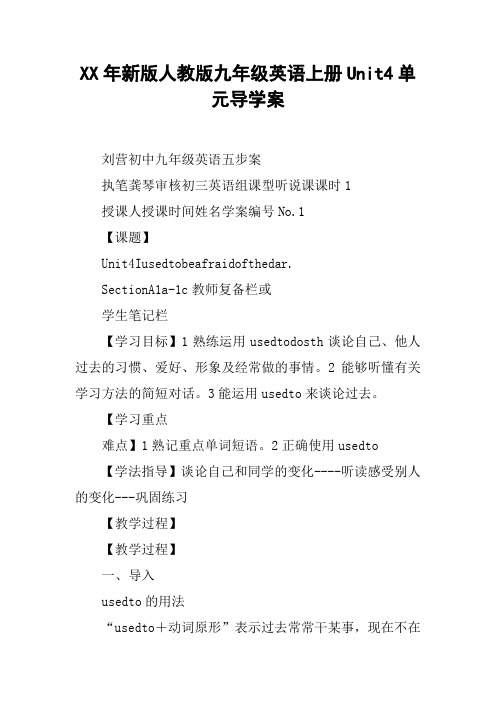
XX年新版人教版九年级英语上册Unit4单元导学案刘营初中九年级英语五步案执笔龚琴审核初三英语组课型听说课课时1授课人授课时间姓名学案编号No.1【课题】Unit4Iusedtobeafraidofthedar.SectionA1a-1c教师复备栏或学生笔记栏【学习目标】1熟练运用usedtodosth谈论自己、他人过去的习惯、爱好、形象及经常做的事情。
2能够听懂有关学习方法的简短对话。
3能运用usedto来谈论过去。
【学习重点难点】1熟记重点单词短语。
2正确使用usedto【学法指导】谈论自己和同学的变化----听读感受别人的变化---巩固练习【教学过程】【教学过程】一、导入usedto的用法“usedto+动词原形”表示过去常常干某事,现在不在干了。
只有一种形式,即过去式。
例如:Iusedtogotoorbybus.NoItaeataxi.Sothesentence“Iusedtobeafraidofthedar.”eansinchinese:我过去常害怕黑暗。
“usedto”的疑问形式和否定形式:—Didyouusetobeafraidofthedar?—yes,Iusedtobeafraidofthedar.—Didheusetobeafraidofthedar?—No,hedidnotusetobeafraidofthedar._Thereusedtobeachurchhere,didn‘tthere?跟踪练习He________________afterschool.放学后他过去常常踢足球。
He_________________________________.他过去不吸烟。
Heusedtoplayfootball.___________________________________________________ ____朗读,体会usedto的用法Bob:o,ario,youloodifferent!youusedtobeshort,didn’tyou?ario:yes,Idid.NoI’tall.Andsoareyou!Bob:That’strue.Andyouusedtoearglasses.Ay:Hi,Bob.Hoareyou?Bob:Fine.o,you’vechanged!Ay:Really?Ho?Bob:youusedtohaveshorthair.Ay:youreeberthat?yes,Idid.二、自学朗读、翻译短语Ihaven’tseenyouforfouryears!acoupleofdays.NoI’tall.Andsoareyou!youusedtoearglasses.you’vechanged!youusedtohaveshorthair.youusedtobereallytall!Notanyore.itusedtobered,didn’tit?itusedtobecurly.youusedtobeshort,didn’tyou?复习反意疑问句,完成练习:Lilyillgotochina,___________?Shedoesn’tefrochina,________________?youhaven’tfinishedhoeor,___________?HenoslittleEnglish,_______________?三、交流注意谈论外貌和性格的不同句型hat’she\shelie?hatdoeshe\sheloolie?完成1a两人一组谈论自己过去的外表、性格等及与现在的不同。
- 1、下载文档前请自行甄别文档内容的完整性,平台不提供额外的编辑、内容补充、找答案等附加服务。
- 2、"仅部分预览"的文档,不可在线预览部分如存在完整性等问题,可反馈申请退款(可完整预览的文档不适用该条件!)。
- 3、如文档侵犯您的权益,请联系客服反馈,我们会尽快为您处理(人工客服工作时间:9:00-18:30)。
XX年新版人教版九年级英语上册Unit4单元导学案本资料为woRD文档,请点击下载地址下载全文下载地址刘营初中九年级英语五步案执笔龚琴审核初三英语组课型听说课课时授课人授课时间姓名学案编号No.1【课题】Unit4Iusedtobeafraidofthedark.SectionA1a-1c教师复备栏或学生笔记栏【学习目标】熟练运用usedtodosth谈论自己、他人过去的习惯、爱好、形象及经常做的事情。
2能够听懂有关学习方法的简短对话。
3能运用usedto来谈论过去。
【学习重点难点】熟记重点单词短语。
2正确使用usedto【学法指导】谈论自己和同学的变化----听读感受别人的变化---巩固练习【教学过程】【教学过程】一、导入(启发探究3分钟)usedto的用法“usedto+动词原形”表示过去常常干某事,现在不在干了。
只有一种形式,即过去式。
例如:Iusedtogotoworkbybus.NowItakeataxi.Sothesentence“Iusedtobeafraidofthedark.”meansinchinese:我过去常害怕黑暗。
“usedto”的疑问形式和否定形式:—Didyouusetobeafraidofthedark?—yes,Iusedtobeafraidofthedark.—Didheusetobeafraidofthedark?—No,hedidnotusetobeafraidofthedark._Thereusedtobeachurchhere,didn‘tthere?跟踪练习He________________afterschool.放学后他过去常常踢足球。
He_________________________________.他过去不吸烟。
Heusedtoplayfootball.___________________________________________________ ____朗读,体会usedto的用法Bob:wow,mario,youlookdifferent!youusedtobeshort,didn’tyou?mario:yes,Idid.NowI’mtall.Andsoareyou!Bob:That’strue.Andyouusedtowearglasses.Amy:Hi,Bob.Howareyou?Bob:Fine.wow,you’vechanged!Amy:Really?How?Bob:youusedtohaveshorthair.Amy:yourememberthat?yes,Idid.二、自学(自主探究6分钟)朗读、翻译短语Ihaven’tseenyouforfouryears!acoupleofdays.NowI’mtall.Andsoareyou!youusedtowearglasses.you’vechanged!youusedtohaveshorthair.youusedtobereallytall!Notanymore.itusedtobered,didn’tit?itusedtobecurly.youusedtobeshort,didn’tyou?复习反意疑问句,完成练习:(1)Lilywillgotochina,___________?(2)Shedoesn’tcomefromchina,________________?youhaven’tfinishedhomework,___________?HeknowslittleEnglish,_______________?三、交流(合作探究0分钟)注意谈论外貌和性格的不同句型what’she\shelike?whatdoeshe\shelooklike?完成1a两人一组谈论自己过去的外表、性格等及与现在的不同。
例如:Iusedtobeshort,butnowIamtall.)听磁带一次,总体感悟语音语调。
听磁带一次,完成1b跟读磁带一次,把握1b内容朗读材料,模仿语音语调和句群停顿。
两人一组谈论他人过去的外表、性格等及与现在的不同,完成1c。
例如:Didmariousetobeshort?yes,hedid.Heusedtobereallyshort.what’shelikenow?He’stallnow.想一想:usedtodo/beusedtodoing/beusedtodo的区别是什么?四、总结(引深探究5分钟)A辨析:usedtodo/beusedtodoing/beusedtodousedtodo,表示______________,是过去时态,用于描述过去常常发生的动作或存在的状态。
我过去害怕黑暗。
Iusedto________afraidofthedark.be/getusedtodoing,表示_____________.玛利亚习惯早起。
mariaisusedto_____________upearly.beusedtodo,表示_______________,相当于_________________.火可以被用来做饭。
Firecanbeusedtocookfood.=Firecan________________________food.练习.mother_____usstorieswhenwewereyoung.edtotellingB.isusedtotelledtotellD.isusedtotelling2.我习惯走路上学。
I_____________________toschool.3.Heusedtosmoke,_____________?4.李先生过去住在美国,所以习惯吃西餐。
mrLi_____________inAmerica,sohe____________________ ___westerndishes.5.______usedto______anoldbookshelfinmyroom.A.There;beB.There;havec.It;beD.There;having6.小刀是用来切东西的。
knives______________________things.=knives______________________things.B、辨析:beafraidofbeafraidtobeafraidtodo 不敢,胆怯去做某事,是主观上的原因不去做,意为"怕";.Shewasafraidtostepfurtheringrassbecauseshewasa fraidofbeingbittenbyasnake.她生怕被蛇咬着,而不敢在草丛中再走一步。
2.Shewasafraidtowakeherhusband.她不敢去叫醒她丈夫。
beafraidofdoing 担心出现doing的状况、结果。
doing 是客观上造成的,意为"生怕,恐怕"。
.Don'tbeafraidofaskingquestions.不要怕提问题.2.Evenifyoudonotfeardeath,thenyouwillbeafraidofwhat?如果你连死亡都不惧怕了,那么你还会惧怕什么呢?ernmentsshouldbeafraidoftheirpeople.人们不应该害怕政府,相反,政府应该害怕他的人民。
4.Shewasafraidofwakingherhusband.她生怕吵醒她丈夫。
五、练评(包含“考点链接”应用探究6分钟)1.Herson________coke,butnowhe________milk.A.usedtodrink;isusedtodrinkingB.usedtodrinking;drinksc.isusedtodrinking;usedtodrinkD.isusedtodrink;isdrinking2.myuncle________abusinessman,butnowheisafactorywor ker.A.usedtobeingB.wasusedtobec.usetobeD.usedtobe3.Betty________manyfriendstoplaywith.A.usedtohaveB.usetohavec.usedtohavingD.usetohaving4.maryusedto____towork,butsheisusedto______toworknow.A.ridingabike;takingabusB.ridingabike;takeabusc.rideabike;takingabusD.rideabike;takeabus阅读短文,完成任务。
whenIwasyoung,Iwasaverynaughtyboy.ButnowIamnotnaugh tyanymore.Ioftenmadetroublewhichmadebothmyfatherand motherveryworried.IlikedwatchingTVallthedayandIdidn’tliketogotobedearly.Ioftenforgottodomyhomework,somy teacherwasn’thappy.ButIhadagoodhabit.Ilikedeating.Ididn’tcarewhatfoodmyparentsgaveme.Icouldfinishallthefood Icouldsee.根据短文内容,用第三人称完成下列短文whenhewasyoung,henaughty.His2were3abouthim.Hewould4allthedaywatchingTV.Hedidn’t5early.Hecouldn’t6hishomework,sohisteacherwas7withhim.Buthehadaverygood8habit.Hedidn’t9whatfoodhisparentsgavehim.Hecouldeat 0allthefoodthathecouldsee.【教学反思】刘营初中九年级英语五步案执笔龚琴审核初三英语组课型听说课课时授课人授课时间姓名学案编号No.2【课题】Unit4Iusedtobeafraidofthedark.SectionA2a-2c教师复备栏或学生笔记栏【学习目标】熟练运用usedtodosth谈论自己、他人过去的习惯、爱好、形象及经常做的事情。
2能运用usedto来谈论过去。
3.记住本课单词、短语【学习重点难点】熟练运用usedtodosth谈论自己、他人过去的习惯、爱好、形象及经常做的事情。
